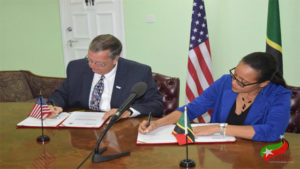 The Government of St. Kitts and Nevis and USAID officially signed, on April 30, a Memorandum of Understanding (MOU) solidifying their unwavering support for the youth of the federation.
The Government of St. Kitts and Nevis and USAID officially signed, on April 30, a Memorandum of Understanding (MOU) solidifying their unwavering support for the youth of the federation.
Permanent Secretary in the Ministry of Youth, Stanley Knight, explained that the Youth Empowerment Services Project (YES), which was initiated by USAID, had been instrumental in the undertaking of reducing crime and violence within communities and more importantly empowering young persons.
“We have seen this articulated through three distinct programmes such as the Juvenile Justice Reform Project, the Child Family Youth Resilience Programme and the CariSECURE Programme,” he said. “It is a pleasure for us to be here this afternoon to formally sign a Memorandum of Understanding between USAID and the Government of St. Kitts and Nevis.”
Christopher Cushing, Mission Director for USAID, said that the United States Government through its embassy in Bridgetown, Barbados, is pleased to solidify its relationship with the Government of St. Kitts and Nevis through the signing of the MOU.
“This Memorandum of Understanding will reinforce the already excellent collaborative relationship that USAID and the Government of St. Kitts and Nevis have had for many years,” said the mission director. “We look forward to working with our country partners in St. Kitts and Nevis to create stronger systems and services that build resiliency among the youth through the Youth Empowerment Services Project.”
Mr. Cushing explained that Youth Empowerment Services Project (YES) will assist in reducing the risk factors that drive youth crime, violence and victimization and promote an evidence based approach to crime and violence in response to one of the country’s most important resources, its youth.
Minister of State, Honourable Wendy Phipps, on behalf of the government, expressed that she is delighted that both parties are at a juncture to formalize their relationship. She added that the government and USAID have developed a relationship over time that engendered creative and results- oriented approaches to address the ongoing crime issues, especially crime involving youth.
The minister said further that the government is also happy for the opportunity to look at different programmes, as well as rehabilitation and reintegration of youth who come in conflict with the law.
“We are also looking forward to the preventive portions in terms of targeting even younger age children outside of the target group, which is 10 to 29,” said Minister Phipps. [This is] because our regional evidence is also showing us that some of our attraction to gang membership is starting even beyond that, age nine or eight for example. So, the overtures and programming and the projects would need to start at an earlier age.”
Minister Phipps said that the government is happy that this approach towards crime and violence, especially among youth, is a more comprehensive and more holistic approach that looks at the community, the nucleus of the community, which is the family structure, and looks at the support systems that communities should provide.
“By that token, we are also heartened by the fact that in partnership with the government and with USAID, there would be the various community services organizations to help us advance that mission,” she said. “So, we’re very grateful for the tangible support not just in terms of monetary support, but also in terms of the inputs provided by our government as well as the technical support in capacity building and the best practices that we can transfer to St. Kitts and Nevis to ensure that this phase of the YES programme, which focuses on Guyana, St. Kitts-Nevis and Saint Lucia, will be for the betterment of our young people going forward.”
